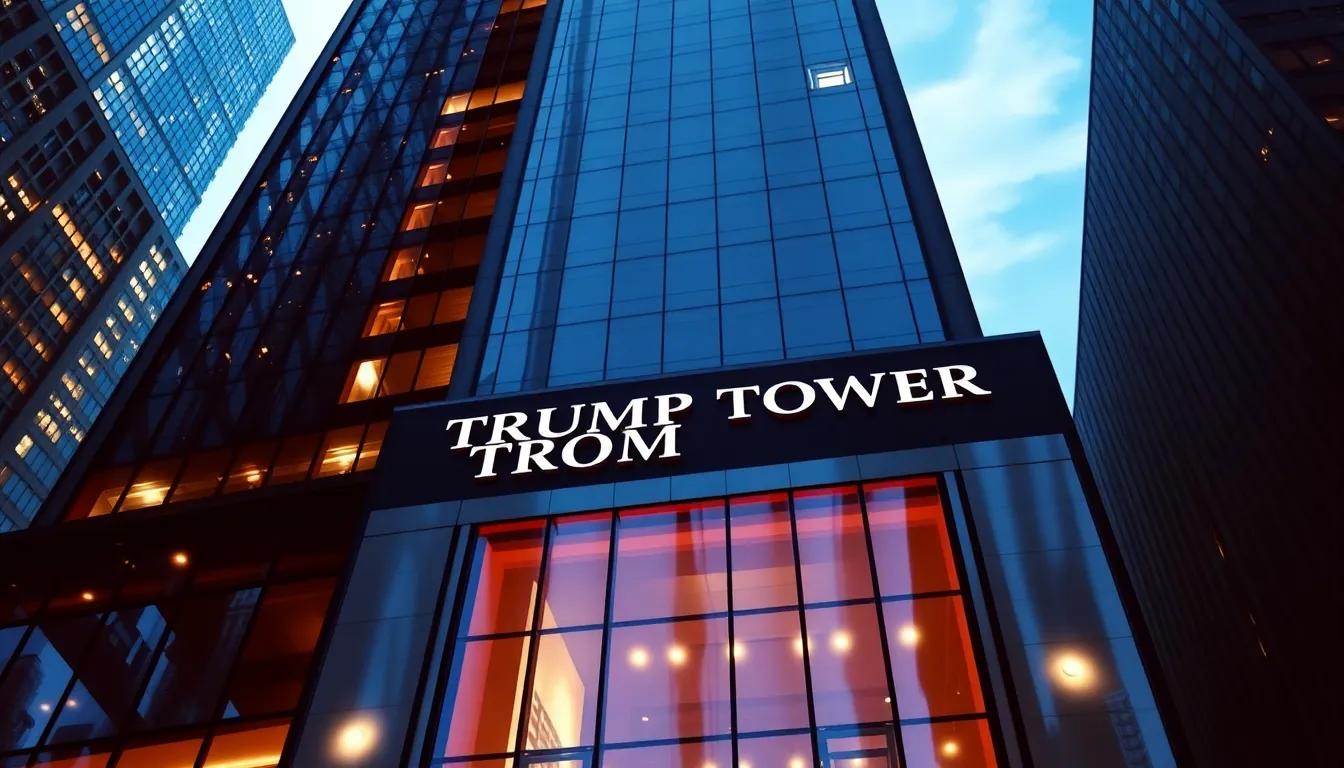When it comes to wealth, few names spark as much curiosity as Donald Trump. Whether he’s dazzling crowds with his larger-than-life persona or making headlines for his business ventures, his net worth is a topic that never fails to intrigue. But just how much is this real estate mogul and former president really worth?
From luxury hotels to golf courses and reality TV fame, Trump’s financial journey is as colorful as his personality. As he navigates the highs and lows of the business world, the numbers can be as slippery as a wet floor in one of his casinos. Buckle up as we dive into the whirlwind of Trump’s finances, uncovering the truth behind the headlines and the numbers that keep everyone guessing.
Table of Contents
ToggleOverview of Donald Trump’s Wealth
Donald Trump’s net worth has fluctuated significantly over the years. Estimates of his wealth range from $2.5 billion to $3 billion, depending on various sources. This wealth stems from a diverse portfolio of real estate, entertainment, and brand partnerships. Lucrative ventures include luxury hotels, golf courses, and the hit reality TV show “The Apprentice.”
Real estate investments play a crucial role in Trump’s fortune. Trump’s properties in Manhattan, such as Trump Tower, stand as premium assets. Additionally, various golf courses across the United States contribute to his financial profile. His brand extends beyond real estate, with licensed products generating substantial revenue.
Bankers and financial institutions often assess Trump’s assets and liabilities, which can change dramatically. Reports sometimes reveal sudden shifts in net worth, highlighting the volatile nature of his investments. Analysts note that market conditions and business strategies drive these fluctuations.
In 2020, Forbes estimated Trump’s wealth at around $2.5 billion, a decrease from previous years. The impact of the COVID-19 pandemic affected many of his businesses, particularly in hospitality and entertainment. Nevertheless, Trump’s ability to leverage his brand has allowed him to maintain a significant financial presence.
Public perception of Trump’s wealth often influences his political image. Headlines and reports frequently draw attention to his significant earnings, fueling curiosity about the number itself. Financial disclosures reveal some details but leave other aspects of his wealth ambiguous.
Transparency regarding Trump’s finances remains a subject of debate. Critics argue that lack of clarity complicates understanding his true financial standing. As such, following updates on Trump’s wealth becomes essential for monitoring any developments in his business dealings and investments.
Sources of Donald Trump’s Income

Donald Trump’s diverse sources of income reflect his multifaceted business approach. From real estate to entertainment, each venture contributes significantly to his overall wealth.
Real Estate Ventures
Real estate forms the backbone of Trump’s financial success. Properties like Trump Tower in Manhattan anchor his portfolio, enhancing visibility and value. Various golf courses across the United States also generate substantial revenue. The estimated value of these properties fluctuates due to market conditions and overall demand. Investment in high-end commercial properties continues to yield profits. Trump’s ability to negotiate lucrative deals sets him apart in the real estate arena.
Media and Entertainment
Media and entertainment ventures add notable revenue streams to Trump’s net worth. The reality television show “The Apprentice” catapulted him into household name status, significantly boosting his brand. Additionally, appearances on talk shows and news segments maintain his public visibility. Through licensing agreements, Trump monetizes his image and name, further amplifying his earnings. Media ventures not only enhance public perception but also create lasting partnerships that contribute to ongoing income.
Brand Endorsements
Brand endorsements play a crucial role in Donald Trump’s income. Collaborations with various companies lead to substantial endorsement deals. Licensing his name for products, from clothing lines to home goods, generates significant royalties. Relationships with well-known brands help enhance his image while diversifying revenue streams. Trump’s unique branding strategy continues to attract a variety of lucrative partnerships across different sectors.
Estimating Trump’s Net Worth
Estimating Donald Trump’s net worth involves analyzing various financial aspects. Key methodologies include asset valuation, debt assessment, and income analysis. Real estate appraisals play a major role in determining property values, such as Trump Tower and other prime locations. Business earnings also contribute to the overall picture, with revenues generated from different ventures. Financial institutions often adjust estimates based on market trends, making it essential to consider multiple sources for accuracy.
Methodologies for Calculation
Calculating Trump’s wealth requires distinct methodologies tailored to his multifaceted portfolio. Asset valuations, including real estate and brand worth, contribute to the overall estimates. Debt figures also factor in, as they reduce net worth. Earnings assessment, particularly from reality TV and licensing deals, further shapes the financial landscape. Consulting reports from Forbes and Bloomberg provides insight into fluctuations over time, ensuring calculations reflect his current financial situation.
Recent Valuations and Trends
Recent valuations of Trump’s net worth indicate significant fluctuations influenced by market conditions. Forbes estimated his wealth at approximately $2.5 billion in 2020, a decrease primarily attributed to the pandemic’s effect on his businesses. Real estate values have also experienced volatility, altering overall assessments of his portfolio. As reported, brand partnerships continue generating revenue, contributing positively to his financial status. Analysts recommend monitoring economic trends and industry shifts to better understand future valuations of his wealth.
Controversies Surrounding Trump’s Wealth
Trump’s wealth often generates debate, primarily due to the unpredictability of his financial standing. Discrepancies exist between various estimates of his net worth, which range from $2.5 billion to $3 billion. Public figures and financial experts frequently analyze Trump’s reported assets, sparking discussions about transparency and accuracy in financial disclosures.
Criticism arises regarding the sources of Trump’s wealth. Real estate remains a significant contributor, yet fluctuations in property values lead to questions about the stability of his financial base. In 2020, the COVID-19 pandemic notably impacted his hospitality ventures, resulting in a dip in his estimated net worth according to Forbes, which assigned a value of around $2.5 billion.
Legal challenges further complicate Trump’s financial narrative. Lawsuits and investigations related to his businesses have raised eyebrows, leading to scrutiny about potential misrepresentations of asset values. These issues amplify public skepticism surrounding his wealth, suggesting that more information may exist beyond what’s publicly shared.
Moreover, brand partnerships play a crucial role in his financial picture. Licensing agreements generate substantial revenue, yet the effectiveness of these partnerships can fluctuate based on Trump’s public image and the current political climate. Analysts highlight the connection between his media presence and wealth, noting that public perception can significantly influence his financial reality.
Overall, the ongoing debate around Trump’s wealth underscores the need for continual reassessment of his financial standing. As new developments emerge, understanding the complexities of his finances becomes increasingly important for grasping the full extent of his wealth.
Comparisons with Other Billionaires
Donald Trump’s net worth draws comparisons with several notable billionaires. Jeff Bezos, founder of Amazon, holds an estimated net worth of $153 billion, showcasing the tech industry’s immense wealth generation. Conversely, Elon Musk, CEO of Tesla and SpaceX, fluctuates around $230 billion, demonstrating the volatility of asset-based fortunes.
Mark Zuckerberg’s wealth, primarily derived from Facebook, stands at approximately $116 billion, highlighting his success in social media and technology. While Warren Buffett, the famed investor, sits at an estimated $114 billion, his wealth is a testament to strategic investments over decades.
The comparisons illustrate the varying sources of wealth among billionaires. For instance, Trump’s wealth centers on real estate, unlike Bezos and Musk, whose fortunes arise from technology and innovation. Trump’s investments in luxury hotels, golf courses, and media ventures provide different revenue streams.
Recent financial events also contribute to comparisons. In contrast to Trump’s declines during the pandemic, many tech billionaires saw significant increases in wealth, primarily due to digital commerce’s boom. This contrast emphasizes how economic factors can disproportionately affect various sectors.
Investors and analysts often scrutinize these comparisons for insights into market dynamics. Wealth fluctuations among these individuals signal broader economic trends and consumer behavior patterns. Evaluating Trump’s position alongside others helps contextualize his financial standing within the billionaire landscape.
Donald Trump’s net worth remains a subject of fascination and debate. With estimates fluctuating between $2.5 billion and $3 billion his financial journey reflects the complexities of his diverse business ventures. The impact of market conditions and public perception plays a significant role in shaping his wealth.
As Trump’s brand continues to evolve so does the conversation around his financial standing. Ongoing scrutiny of his business dealings and legal challenges adds layers to the narrative. Keeping an eye on economic trends and industry shifts will be essential for understanding the future of Trump’s wealth. The interplay between his public image and financial reality ensures that discussions about his net worth will persist, capturing public interest for years to come.



